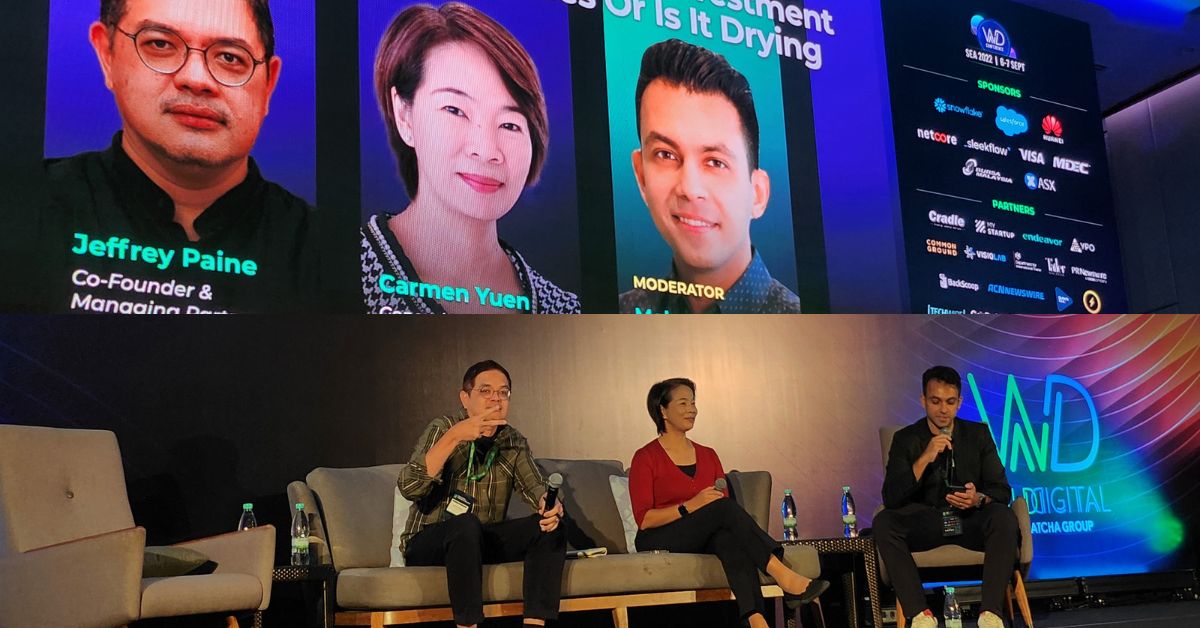While SEA was once known as an ideal region for tourists, the startup ecosystem has seen a significant uptick in recent years.
This may be accredited to growing talent pools, government contributions, as well as an influx of capital from regional partners.
Many also attribute the rapid tech adoption to the pandemic, with lockdowns emphasising the need for ecommerce, fintech, and logistics. These industries will still remain the engines of growth into the near future.
With the dust settling from the economic disruption that is COVID-19, will the attention of booming sectors shift in the eyes of investors and venture capitalists (VCs)?
Three industry experts came to speak on the matter during a panel at Wild Digital Southeast Asia 2022.
Mohan Belani, co-founder and CEO e27, was the moderator speaking to VCs Carmen Yuen, General Partner of Vertex Ventures SEA & India (Vertex), and Jeffrey Paine, co-founder and Managing Partner at Golden Gate Ventures (GGV).
1. Ongoing funding despite unstable economic conditions
Some are of the perspective that VCs are cutting fewer cheques and taking things slow due to the current unstable economic conditions. Carmen challenged this perspective, sharing that Vertex is always investing in companies to grow them for an exit strategy, then the cycle repeats.

She stated that the world is progressing forward, and innovation will continue to happen, whether in good times or bad.
In fact, Vertex is in the midst of fundraising for its fifth fund, which the team intends to deploy around Q1 next year.
Jeffrey had a similar view on the matter, adding that while they tend to be picky, funding never stops. After all, new ventures are important to every country, especially emerging ones.
2. VC eyes on are on these high growth sectors in the startup industry
Elaborating on her earlier point, Carmen specified that while innovations are happening, there are two kinds of pools.
She expanded, “Are we innovating things that are incremental, or are we looking at things that take a lot of time, but will fix a big problem?”
The latter which fixes a larger, deeper issue thus requires a significant amount of time to develop before it’s ready for the market.

With that, Mohan asked the VCs about their perspectives on which sectors have high growth potential over the next five years, ones that Vertex and GGV would be keen to fund.
Carmen answered first, pointing out that Vertex looks at five main areas, including B2B (business-to-business), SaaS (Software-as-a-Service), fintech, healthtech, and sustainability. She elaborated that the sustainability sector may include solutions that address climate change (climate tech).
For GGV, interesting sectors Jeffrey named included fintech, agritech, and climate tech, which classifies as part of the deeptech sector that’s rarer to find.
Did you know: Deep technology (deeptech) or hard tech is a classification of a startup company, with the expressed objective of providing technology solutions based on substantial scientific or engineering challenges.
3. Banking on deep tech and climate tech for the future
With sustainability and climate change being a topic more companies and individuals are taking seriously, both Carmen and Jeffrey are looking to fund such startups with relevant solutions.
Under the umbrella term of climate tech, some areas include solutions looking into carbon input or output, electrification, storage, and more.

As for deeptech, some examples may include launching rockets or satellites into space, and R&D in lithium batteries.
Deeptech startups tend to come up with solutions for the B2B or B2G (business-to-government) market, such as one of GGV’s portfolio companies, SpeQtral, which deals with quantum communication systems for governments.
Did you know: Quantum communication takes advantage of the laws of quantum physics to protect data. These laws allow particles—typically photons of light for transmitting data along optical cables—to take on a state of superposition, which means they can represent multiple combinations of 1 and 0 simultaneously.
Technology Review
Carmen chimed in, sharing that Vertex does have one deeptech company in its portfolio that deals with autonomous vehicles.
These innovations fit into Carmen’s earlier classification of solutions that take a lot of time to develop before it’s ready for the market, but will fix bigger, deeper problems in the end.
Deeptech startups will require plenty of capital and early-stage funding to pad the operational expenses of companies.
Jeffrey pointed out that when it comes to seeking an investor for such startups, founders need to look for ones who are willing to grow the company with them, ones that understand deeptech as an industry too.
“When you raise, you need to find investors who know how to go through these cycles to fund you all the way,” he said.
4. When it comes to what startups are attractive to VCs, to copy, or not to copy?
Because Silicon Valley is viewed as the gold standard for startups, Carmen and Jeffrey were asked whether or not SEA companies should attempt copying existing business models. Would doing so be relevant in the first place?

Jeffrey pointed out that it can be risky to do so. For SEA startups who plan to copy a solution from Silicon Valley, they need to build their company’s presence in multiple SEA countries from the get-go.
“’Cause by the time you build the solution in Malaysia then only plan to expand, then it’ll be too late because Vietnam, Indonesia, and Singapore would’ve already come up with their own versions to the solutions,” Jeffrey warned.
“If you copy lock, stock, barrel, you’ll fall flat.” Carmen chimed in. “China became what it is today because they started what was in the [Silicon] Valley, and they’ve improved on it and localised it and now it’s become a powerhouse.”
With a more optimistic perspective, Carmen shared that copying can be beneficial, and addressed that SEA startups have been doing a pretty good job at it. These entrepreneurs have been able to internalise existing solutions and make them applicable to the local context.
“We’ve also got SEA companies that developed global solutions from the onset, so we have quite a few unicorns that have come up with innovations to build globally,” Carmen praised.
5. If you want strong markets to execute exit strategies, look here
There are startups that want to continuously grow and become unicorns, and there are those with an exit strategy to generate investment returns for their investors and shareholders.
Some common ways for companies to do so include listing on the stock market, or via mergers. Other than the US stock exchanges, Mohan asked Carmen and Jeffrey to name some strong markets in SEA as well.
Carmen named the Singapore Stock Exchange (SGX) and Indonesia Stock Exchange (IGX) as promising contenders. She added that amidst the economic situation thus far, The Stock Exchange of Thailand (SET) has also been pretty stable despite other public markets going on a slide.

Jeffrey seconded that, agreeing that these are the three most advanced markets in SEA.
When it comes to mergers and acquisitions, startups can either look into being acquired by larger corporations, or merge with other startups.
Carmen believes that most startups would opt for such exit strategies as she’s seen most of Vertex’s portfolio companies do so via trade or secondary sales.









